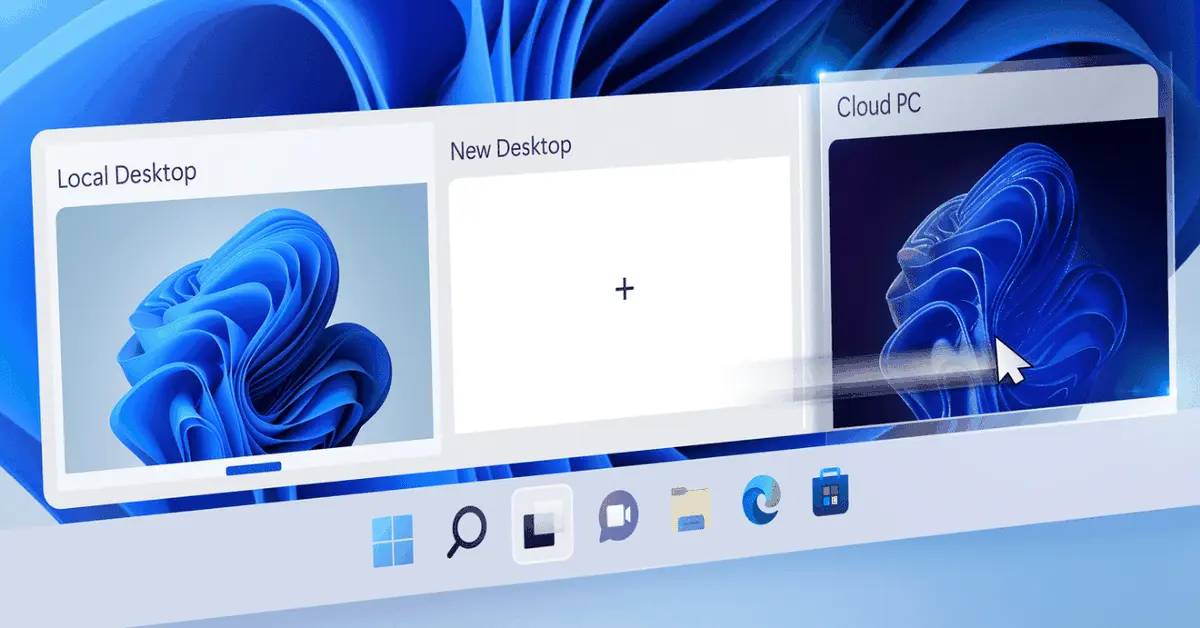Another win for the Linux gang!
So if I don’t have an internet connection, I can’t even boot my computer?
Big “you’ll own nothing and be happy” energy.
As long as it’s opt-in then there are also huge benefits. Updates would happen organically, less issues with driver support for your specific manufacturer, laptops would become even thinner and lighter, you could run windows on virtually (lol) anything and they could even sell tiered hardware so that you could game in the cloud (this tech is getting better and better). I love my Shadow PC for gaming and other nonsense, being able to play modern games with maxed out graphics on my fan-less MacBook Air is a dream.
I also work in IT and there are so many bullshit companies offering cloud based services that run specific software in the cloud, RightNetworks being one of them, but one thing I like is it’s almost completely hands off on my end and if the whole OS is running in the cloud then it would be cake for provisioning and remote management.
So if I don’t have an internet connection, I can’t even boot my computer?
While I personally hate this Idea as well, I have to admit, that there could certainly be rather significant upsides for users.
Cheap Chromebook-like Laptops, but can run Video Games, Video Encodings, Finite Element Analyses, Computational Fluid Dynamics etc no problem. “Your” PC can be accessible from your phone in a Pinch.
You open a weird Link and got a Virus? No problem, just roll back your “PC”
Your home floods/burns down? All the images from your children are still safe.
Never being bothered by needing a hardware upgrade.Being able to run video games or other hardware intensive process would either require pricey hardware or they’d be streamed from a cloud service (which comes with a whole other bundle of issues to consider) as that computational power has to come from something physical somewhere. Offloading your OS to the cloud wouldn’t affect that. PCs can already be accessed by phone if you have the right set up (dedicated IP hosting and a VPN) As for saving data in case of emergencies, we already have cloud based storage solutions that wouldn’t be impacted by cloud based OS.
There is 0 reason to use a cloud based OS other than making sure people are tied to your service for the life of their computer. This feels like a solution to a problem no one has.
I believe the poster above you was referring to full cloud-hosted Virtual Desktops, not just cloud-hosted OS. The former would make a lot more sense and would indeed allow for need-based scaling of resources without any expensive local hardware. I think this is the future of the common man’s computing experience - a nice monitor that also functions as a thin client to access web-hosted virtual desktops.
It’s the Adobe model though. It’ll seem attractive to start with compared to upgrading every few years, but soon enough you’ll be paying out the nose for it.
Yup, that was what I understood it to be, I’ll admit to just skimming the article, but it seemed rather directly that?
Windows 365 is a service that streams a full version of Windows to devices. So far, it’s been limited to just commercial customers, but Microsoft has been deeply integrating it into Windows 11 already. A future update will include Windows 365 Boot, which will enable Windows 11 devices to log directly in to a Cloud PC instance at boot instead of the local version of Windows. Windows 365 Switch is also built into Windows 11 to integrate Cloud PCs into the Task View (virtual desktops) feature.
Can’t afford your monthly windows cloud bill? Lose access to all your data, important files, pictures of your kids, music library.
Fuck everything about that with a rusty spoon.
All for the low low price of…your freedom, privacy, security, and consumer rights.
MS can kiss my piss.
I hope that gaming on linux then is as seamless as it is on windows today. Because the rest of the things that I do with my PC are already equal, but gaming is the big reason I still use windows.
Steam has that on lock right now. No, it’s not perfect, but for most games it’s pretty much seamless.
There are some cases where Windows is better - mod management tools are better on Windows, for instance. Anything you have outside of Steam might need another app like Lutris (or Heroic, which is great for GOG btw). And that’s not mentioning malware under the guise of “anti-cheat”.
Gaming Linux has been seamless for 2-3 years now. I stopped checking Linux compayibility scores around 2021 because I expect everything to work now.
Don’t know what games you are playing, but I game myself quite heavily and doing it exclusively on Linux. Steam proton has changed a lot of things for Linux gaming. Only issues are with anti cheat. So if you are playing single player you are good to go. Multiplayer can be difficult, it depends on the game. I have 200 hours on Apex in Linux.
I switched back to windows for gaming because NVidia drivers are terrible and I had so many issues with many game that no amount of googling and debugging could fix. Linux also doesn’t have HDR support yet (it’s in the work though)
I really prefer Linux, but I had so many non trivial issues. I know this isn’t the same experience for everyone, but considering I do gaming 95% of the time on my personal PC, I got fed up of hitting a wall for the games I wanted to play.
I will buy an AMD gpu when I will switch so that hopefully the open sourced drivers will fix my issues.
I still daily drive linux for work though.
It does have HDR support already though, it’s just via GameScope.
Yeah, anti-cheat/multiplayer is the biggest hurdle to go for linux gaming, as well as VR. They’re the two things that continue to hold my kids in Windows, for now. I hope that someday they’re remedied and I can move them into Linux systems for gaming, but for now, it’s just not realistic, sadly.
A lot of anticheat actually works pretty well now, it’s super cool how much Valve continues to push Proton development forward
I’ve been trying out linux gaming annually. With the steam deck out it proton has become super good. I think my gaming pc is finally going to stay on linux this time around.
2023, the year that big tech shot it self in the face, continues.
man, this might be thing that finally makes me switch to Linux. what an incredibly stupid, shitty, and greedy decision.
Windows 10 not allowing you to postpone updates when it launched pissed me off enough to switch to linux for around 4 years. I came back for games, but the GPU market (and age) has pushed me back to consoles or just not gaming.
Check again Linux gaming, Proton/Wine is surprisingly viable now and the vast majority of games run without any issue.
I’ve heard Linux gaming is pretty good now with a native steam client and a ton of games that run natively thanks to steamOS
the ton of games doesn’t run natively, they run well, but through a translation layer (wine/proton)
To be exact it’s not a translation layer, but a reimplementation of the Windows APIs and ABIs on Linux.
That’s why there is no performance cost.
And if you want to know, if a game works, check protondb.com . It’s for proton, so steam, and includes a steam deck section. And many games, that don’t have a native linux version, come with great tips on how to make them run, if a game does not run with proton out of the box. Most just need a different proton version, which is three clicks to change in steam.
I tried this last year. VR support, even using Valve hardware with Valve’s official VR support for Linux, was not there. In SteamVR menus it was stuttering and mispredicting (everything looks shaky), and in the actual applications it was unstable. It seems like the VR devices work perfectly, but the software for rendering and presenting frames is proof of concept quality. That’s basically the primary purpose of this last Windows machine so I’m kind of stuck.
There’s an open source OpenXR implementation, but I heard it doesn’t support hotplugging, as in if any of your devices disconnect for any reason you need to restart everything.
Do it! Linux is great, and not nearly as hard as its reputation suggests.
Microsoft wants to move me fully to the Linux
bet itll suddenly become subscription based too
Of course, how else will they pay for storage of your data? This part already started with OneDrive. Now you’ll buy a new laptop for $100, the thinnest laptop you’ve ever seen, it will just come with a 128GB m.1 drive soldered to the board, and you’ll run (and save) everything from Microsoft’s servers.
That’s exactly the argument they and their bootlickers will use too. “we need it to run infrastructure!!!” they wouldnt have to run infrastructure if they didnt gut features from their products. Like the whole Toyota remote start subscription crap. “They need the subscription to run the servers so you can start your car from anywhere” but you can no longer use classic radio remote start which doesn’t require servers
That’s exactly the argument they and their bootlickers will use too. “we need it to run infrastructure!!!” they wouldnt have to run infrastructure if they didnt gut features from their products. Like the whole Toyota remote start subscription crap. “They need the subscription to run the servers so you can start your car from anywhere” but you can no longer use classic radio remote start which doesn’t require servers
Hard pass.
I already have to jump through a bunch of hoops to make Win 10/11 tolerable for personal use and preferences Things like ShutUp10 and dozens of manual tweaks, registry settings, policy changes, etc. The cloud version will probably constantly roll all of that back on me.
I really hate this silicon valley mindset that everyone has reliable broadband and worse, they know what the user wants/needs better than the user does.
Enshitificstion is ruthless.
Linux welcomes you :)
I like Linux a lot, I just have never mastered it. I plan on learning it better when I retire.
The writing was on the wall considering how much they’re trying to push Bing into Windows 11. They want everything to be online and connected to their services, and it sucks.
Well, that should be interesting for businesses. I wonder how things will play out with HIPPA, GPDR, and such.
Redmond locking out consumers with shitty/metered Internet connections? What a wonderful idea.
Asking people to move to a subscription model will also be appreciated, I’m sure.
I don’t get it, what’s the benefit of this? Why would your average joe want to use a cloud instance instead of running Windows locally? How does Microsoft benefit from this?
Microsoft gets to sell the sizzle, not the steak. They also have all your data since the OS is running on their computer, not yours. I guess this will make Windows a web app, working like NextCloud only on their machines.
Subscription service, infinite income without requiring innovation!
You can’t torrent on these, that would be my guess.
Is the “cloud” sustainable and scalable, in terms of energy and environmental demands?
No, no – they want to get you to pay for your hardware, mandatory, big network transfers, and cloud resources. None of which are exactly powered by unicorn farts.
It’s probably better because you don’t waste that many hardware resources.
Wow great More always online drm in windows
Recently I moved to a Fedora distro called Nobara for my gaming rig. Microsoft has been working hard to force me out for years. When I have to make custom installers, and run scripts to control updates and telemetry, you’re not being a very inviting OS.
I would switch os if roblox didn’t decide to screw linux users with the byfron anti cheat
I’ve just been testing it out, but tried installing a couple of games through lutris and had no luck with it. Tinkering isn’t an issue, but the system hung so bad when starting Arcanum I had to reboot to get back in. Even after killing wine, the game and gnome-shell I still couldn’t interact with the gui at all.




























